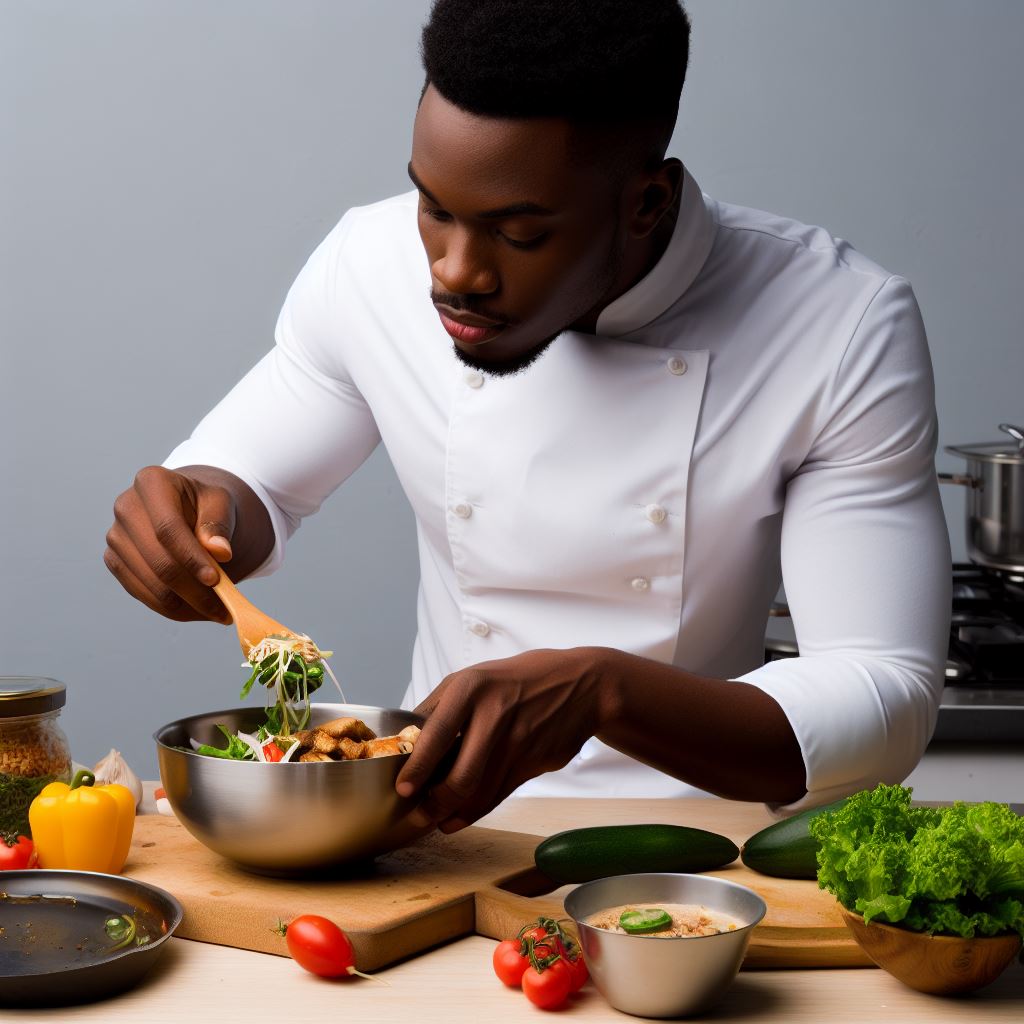Introduction
This blog post will explore Iron Rich Foods to Boost Health.
Iron is an essential mineral that plays a crucial role in maintaining overall health and well-being.
It is responsible for transporting oxygen throughout the body and supporting energy production.
Consuming iron-rich foods is vital in preventing iron deficiency and promoting optimal health.
Including iron-rich foods in your diet offers numerous benefits.
These foods boost the production of red blood cells, improve brain function, enhance muscle strength, and support a strong immune system. Iron also aids in maintaining healthy hair, skin, and nails.
This topic is particularly relevant for Nigerian readers due to the high prevalence of iron deficiency anemia in the country.
Many Nigerians, especially women and children, are at risk of low iron levels, which can lead to fatigue, weakness, and compromised immune function.
By understanding which foods are rich in iron, Nigerians can improve their overall health and prevent iron deficiency.
By promoting awareness of iron-rich foods, this blog post aims to equip Nigerian readers with the knowledge needed to make informed dietary choices.
Including iron-rich foods, such as lean meats, seafood, legumes, and green leafy vegetables, in daily meals can help combat iron deficiency and promote optimal health.
In summary, iron is vital for overall health, and consuming iron-rich foods offers numerous benefits.
This topic is especially relevant for Nigerian readers, who are at risk of iron deficiency anemia.
By incorporating iron-rich foods into their diets, Nigerians can improve their health and well-being.
Overview of Iron Deficiency
Iron deficiency is a common condition characterized by low levels of iron in the body.
Unlock the Power of Nigerian Food Minerals
Discover personalized Food Advisory tailored to boost your health or business using expert insights on Nigerian minerals.
Get StartedIt is a significant health concern as it can lead to various complications if not addressed promptly.
In Nigeria, where malnutrition is prevalent, it is crucial to tackle iron deficiency to improve overall health and well-being.
Iron deficiency and its impact on health
The impact of iron deficiency on health cannot be underestimated.
Iron plays a vital role in transporting oxygen throughout the body, supporting the production of red blood cells, and facilitating proper brain function.
When there is a lack of iron, these essential processes are compromised, resulting in fatigue, weakness, poor cognitive performance, and susceptibility to infections.
Significance of Addressing Iron Deficiency in Nigeria
Addressing iron deficiency in Nigeria is of utmost importance due to its high prevalence and the country’s reliance on agriculture.
Nigeria has a substantial agricultural sector, yet the population lacks access to diverse and nutritious food sources.
This contributes to a higher risk of iron deficiency, as the diets mainly consist of grains and starchy foods, which are low in iron content.
Statistics or facts related to iron deficiency in the country
Statistics and facts related to iron deficiency in Nigeria paint a concerning picture.
According to the World Health Organization (WHO), iron deficiency is the most prevalent nutritional disorder globally, affecting around 30% of the world’s population.
In Nigeria, the situation is even more alarming, with a prevalence rate of approximately 70%.
This means that a significant portion of the population, including children and women of childbearing age, is at risk of iron deficiency-related health complications.
Iron deficiency anemia, the severe form of iron deficiency, is highly prevalent in Nigeria.
It affects approximately 60% of Nigerian children under the age of five and 50% of pregnant women.
Captivate Your Audience with Exclusive Nigerian Food Content
Imagine your platform enriched with unique, mineral-rich Nigerian cuisine stories that no one else can offer. Let's create content that resonates deeply and sets you apart.
Get StartedThe consequences are dire, as it leads to impaired cognitive development in children and increases the risk of maternal mortality.
Additionally, the economic burden of iron deficiency on the healthcare system is substantial, with increased healthcare costs and reduced productivity.
Examples of iron-rich foods
To combat iron deficiency effectively, it is crucial to incorporate iron-rich foods into the Nigerian diet. Here are some examples:
- Red meat: Beef and lamb are excellent sources of heme iron, the type of iron that is most easily absorbed by the body.
- Organ meats: Liver and kidneys are particularly high in iron and other essential nutrients.
- Poultry: Chicken and turkey provide significant amounts of iron, especially when consumed with the skin.
- Fish and seafood: Shellfish like clams and oysters, as well as fish like sardines and mackerel, are excellent sources of iron.
- Legumes: Beans, lentils, and chickpeas are affordable and rich in iron, making them an ideal choice for the Nigerian population.
- Dark leafy greens: Vegetables like spinach, kale, and moringa leaves are not only high in iron but also packed with other vital nutrients.
- Nuts and seeds: Cashews, pumpkin seeds, and sesame seeds are good sources of iron and can be incorporated into snacks or meals.
- Fortified foods: Fortified cereals, bread, and other grain products are enriched with iron and can help meet daily requirements.
By diversifying the Nigerian diet to include these iron-rich foods, the prevalence of iron deficiency can be significantly reduced.
Additionally, public health campaigns, education programs, and increased access to affordable and nutritious foods will play critical roles in tackling this pressing issue.
In essence, iron deficiency poses a significant threat to the health and well-being of the Nigerian population.
Addressing this issue is crucial, considering its impact on cognitive development, maternal mortality, and overall productivity.
By promoting the consumption of iron-rich foods and implementing comprehensive strategies, Nigeria can pave the way towards a healthier and more vibrant future.
Read: Nigeria’s Seafood Delights: Natural Sources of Iodine
Common Iron-Rich Foods in Nigerian Cuisine
Variety of iron-rich foods commonly found in Nigerian cuisine
Iron is an essential mineral that is crucial for maintaining good health. In Nigerian cuisine, there are a variety of iron-rich foods that are commonly consumed.
These foods not only provide a delicious taste but also help to boost iron levels in the body.
Incorporating these iron-rich foods into the diet is important for overall well-being. Let’s take a closer look at some of these foods.
1. Dark Leafy Vegetables
Nigerian cuisine is known for its wide array of dark leafy vegetables such as spinach, ugwu (pumpkin leaves), and bitter leaf.
These vegetables are rich in iron and can be used in various dishes like soups, stews, and stir-fries.
2. Fish
Nigeria is blessed with an abundance of fish, both freshwater and saltwater varieties.
Fish like mackerel, sardines, and tilapia are not only high in iron but also packed with omega-3 fatty acids, which promote heart health.
3. Meat
Meat is a staple in Nigerian cuisine, and it is a great source of dietary iron.
Beef, lamb, and goat meat are commonly consumed and can be cooked in a variety of ways, including grilling, stewing, or frying.
4. Poultry
Chicken and turkey are also excellent sources of iron.
They are lean meats and can be easily incorporated into dishes like soups, stews, and grilled or roasted dishes.
5. Liver
Organ meats like liver are particularly high in iron.
In Nigerian cuisine, liver is commonly used in dishes such as fried rice, pepper soup, and suya.
It not only adds a rich flavor but also provides a significant iron boost.
6. Beans
Nigerian cuisine is incomplete without the inclusion of beans.
Beans, such as black-eyed peas, kidney beans, and lentils, are not only high in iron but also a good source of protein and fiber.
7. Nuts and Seeds
Nuts and seeds like peanuts, cashews, and pumpkin seeds are not only delicious snacks but also rich in iron.
They can be enjoyed as a snack or used as toppings in salads, soups, or porridges.
8. Iron-Fortified Foods
In recent years, there has been an increase in the availability of iron-fortified foods in Nigeria.
These include cereals, bread, and pastas fortified with iron, which can be a convenient way to increase iron intake.
The importance of incorporating these foods into the diet
Incorporating these iron-rich foods into your diet is crucial for maintaining healthy iron levels in the body.
Iron is required for the production of hemoglobin, which carries oxygen throughout the body.
Iron deficiency can lead to fatigue, weakened immune function, and impaired cognitive function.
To maximize iron absorption, it is important to consume iron-rich foods together with sources of vitamin C, such as citrus fruits, tomatoes, or peppers.
Vitamin C enhances iron absorption from plant-based sources, and it is beneficial to include them in the same meal.
In fact, Nigerian cuisine offers a wide variety of iron-rich foods, including dark leafy vegetables, fish, meat, poultry, and beans.
These foods are not only delicious but also provide essential nutrients like iron, which are vital for good health.
By incorporating these iron-rich foods into your diet and combining them with sources of vitamin C, you can ensure optimal iron absorption and boost your overall health and well-being.
Read: Understanding Minerals: Their Role in Nigerian Cuisine
Traditional Nigerian Dishes High in Iron
Nigeria is known for its rich and diverse cuisine, and many traditional dishes are naturally high in iron.
These dishes not only satisfy our taste buds but also provide essential nutrients to boost our health.
In this section, we will highlight some popular Nigerian dishes that can help improve iron levels in the body.
1. Efo Riro
Efo Riro is a delicious traditional Nigerian soup made with vegetables such as spinach, kale, or pumpkin leaves.
It is typically prepared with assorted meat, fish, and palm oil. The combination of these ingredients makes Efo Riro a great source of iron.
If you want to try making Efo Riro at home, you can find a recipe here.
2. Egusi Soup
Egusi soup is a staple in Nigerian cuisine and is loved by many.
It is made with melon seeds, various vegetables, and spices.
Adding ingredients like spinach or bitter leaf to the soup enhances its iron content.
Are you interested in cooking Egusi Soup? Follow this recipe for a delicious and iron-rich meal.
3. Bitter Leaf Soup
Contrary to what the name suggests, Bitter Leaf Soup is a flavorful Nigerian dish.
It is made with bitter leaves, assorted meats, and fish.
The inclusion of iron-rich ingredients like liver or shrimps elevates its nutrient profile.
If you want to try Bitter Leaf Soup, you can follow this recipe to prepare a nourishing and iron-packed meal.
4. Ogbono Soup
Ogbono soup is a thick and hearty Nigerian soup made with Ogbono seeds, meat, and vegetables.
This soup is not only delicious but also provides a decent amount of iron to your diet.
You can find an easy-to-follow recipe for Ogbono Soup here.
5. Ofe Nsala (White Soup)
Ofe Nsala, commonly known as White Soup, is a traditional Igbo dish.
It is made with various meats, fish, and local spices. Adding ingredients like utazi leaves or ugu leaves increases its iron content.
Check out this recipe if you’re interested in trying Ofe Nsala at home.
6. Beans and Plantain
Beans and plantain is a classic Nigerian dish that is not only delicious but also packed with iron.
Consuming beans with plantain helps enhance its iron absorption due to the high vitamin C content of plantain.
If you want to make this simple and iron-rich dish, you can find a recipe here.
These traditional Nigerian dishes make it easier to increase iron levels while enjoying the flavors of Nigerian cuisine.
Incorporating these iron-rich foods into your diet can help boost your overall health and well-being.
Remember to consult with a healthcare professional or registered dietitian for personalized advice regarding your iron intake.
Read: Essential Minerals Found in Common Nigerian Foods

Exploring Local Superfoods
In this section, we will dive into the lesser-known superfoods in Nigeria that are packed with iron and offer numerous health benefits.
These local treasures are not only delicious but also easily accessible and readily available.
1. Utazi Leaves
Utazi leaves, also known as Gongronema latifolium, are commonly used in Nigerian cuisine for their unique bitter taste.
These leaves are an excellent source of iron, calcium, and vitamins A and C.
They promote digestion, lower blood sugar levels, and boost the immune system.
2. Oha Leaves
Oha leaves, scientifically known as Pterocarpus mildraedii, are highly nutritious and commonly used in traditional soups.
These leaves are rich in iron, fiber, calcium, and vitamins C and E.
Oha leaves support healthy brain function, boost the immune system, and aid digestion.
3. Tete Leaves
Tete leaves, also called Amaranthus hybridus, are widely consumed in Nigeria and have a slightly bitter taste.
These leaves are packed with iron, calcium, magnesium, and vitamins A and C.
Tete leaves are known to improve digestion, strengthen bones, and enhance vision.
4. Uziza Leaves
Piper guineense, also called Uziza leaves, hold high value due to their distinct flavor and aroma.
These leaves contain significant amounts of iron, calcium, magnesium, and vitamins A and E.
Uziza leaves aid digestion, relieve respiratory issues, and promote healthy skin and hair.
5. Moringa Leaves
Moringa leaves, also known as “miracle leaves,” are a powerhouse of nutrition.
They are rich in iron, calcium, potassium, and vitamins A and C.
Moringa leaves possess exceptional antioxidant properties, boost energy levels, and support healthy bones and teeth.
6. Hausa Okra
In Nigeria, Hausa okra, scientifically named Corchorus olitorius, thrives as a commonly eaten vegetable.
It is an excellent source of iron, calcium, fiber, and vitamins C and K.
Hausa okra promotes healthy digestion, strengthens bones, and supports weight loss.
7. Garden Egg
Garden egg, a popular fruit in Nigeria, offers numerous health benefits.
It contains iron, calcium, potassium, and vitamins B and C.
Garden egg assists in weight loss, reduces cholesterol levels, and promotes healthy skin and hair.
Superfoods in Nigeria are easily accessible, found in local markets and grocery stores due to local cultivation.
These superfoods abound in Nigeria’s markets, offering affordability and an easy means to increase iron intake.
By incorporating these local superfoods into your diet, you can reap the benefits of their high iron content and other essential nutrients.
Make sure to include a variety of these superfoods in your meals to ensure a well-rounded nutritional intake.
In short, Nigerian cuisine is abundant in lesser-known superfoods that are excellent sources of iron.
With their numerous health benefits and accessibility, incorporating these local treasures into your diet is a simple and effective way to boost your overall health and well-being.
Read: Discovering Nigeria’s Phosphorus-Rich Culinary Traditions
Iron Absorption and Enhancers
Various factors influence iron absorption, either enhancing or inhibiting its assimilation within the body.
Understanding these factors and incorporating certain foods into your diet can help optimize iron absorption and ensure you meet your daily iron needs.
Factors Affecting Iron Absorption
- Vitamin C: Consuming foods rich in vitamin C can significantly enhance iron absorption. Include citrus fruits, bell peppers, strawberries, and tomatoes in your meals.
- Meat, Fish, and Poultry: Heme iron, which is found in animal-based foods, is more easily absorbed by the body compared to non-heme iron found in plant-based sources.
- Non-Heme Iron Enhancers: Some plant-based foods can facilitate the absorption of non-heme iron. These include broccoli, cabbage, Brussels sprouts, cauliflower, and leafy greens.
- Iron Supplements: Taking iron supplements on an empty stomach can enhance their absorption. However, consult a healthcare professional before starting any supplementation.
Foods that Enhance Iron Absorption
- Oranges: High in vitamin C, oranges can boost iron absorption when consumed alongside iron-rich foods.
- Bell Peppers: Loaded with vitamin C, bell peppers are an excellent choice to enhance iron absorption.
- Strawberries: Besides being rich in iron, strawberries also provide a substantial amount of vitamin C.
- Tomatoes: Tomatoes not only contain vitamin C but also provide a good source of iron.
- Meat: Beef, pork, lamb, and liver are all rich in heme iron, which is easily absorbed.
Tips on Combining Foods for Better Iron Absorption
- Pair Iron-Rich Foods with Vitamin C: Include foods rich in vitamin C, such as oranges or bell peppers, in your meals with iron-rich foods like spinach, lentils, or red meat.
- Avoid Inhibitors: Some foods, like tea, coffee, and calcium-rich foods, can inhibit iron absorption. Avoid consuming them with iron-rich meals.
- Cook in Cast Iron Cookware: Cooking acidic foods like tomato sauce or foods high in vitamin C in cast iron cookware can increase iron content.
- Soak and Sprout: Soaking and sprouting grains, nuts, and seeds can reduce their phytate content, which inhibits iron absorption.
- Diversify Your Diet: Include a variety of iron-rich foods in your diet to maximize iron absorption and prevent deficiencies.
Incorporating these practices into your daily routine can help ensure optimal iron absorption and prevent iron deficiency anemia.
Remember to consult a healthcare professional for personalized dietary guidance and check your iron levels regularly.
Read: Health Benefits of Moi Moi: Why It’s Good for Nigerians
Tips for Incorporating Iron-Rich Foods in Daily Meals
Iron is an essential mineral that plays a crucial role in our body. It helps carry oxygen to our cells and supports overall health and wellbeing.
Why is Iron Important?
Adequate iron intake is necessary for maintaining energy levels, supporting brain function, and promoting a strong immune system.
Iron deficiency can lead to anemia, fatigue, and weakened immune response.
Tips for Boosting Iron Intake
- Pair iron-rich foods with vitamin C-rich foods to enhance iron absorption. For example, have a glass of orange juice with your iron-fortified cereal.
- Include red meat, such as lean beef or lamb, in your meals. They are excellent sources of heme iron, which is more easily absorbed by the body.
- Opt for seafood options like oysters, clams, and mussels, as they are also rich in iron.
- Incorporate pulses and legumes like chickpeas, lentils, and kidney beans into your diet. They provide a significant amount of iron.
- Introduce dark leafy greens like spinach, kale, and broccoli into your salads or stir-fries.
- Snack on iron-rich foods such as pumpkin seeds, dried apricots, and almonds during the day.
Iron-Rich Breakfast Ideas
- Start your day with a bowl of iron-fortified cereal topped with sliced strawberries or kiwi.
- Try a spinach and mushroom omelet with a side of whole-grain toast.
- Prepare a smoothie with spinach, banana, almond milk, and a scoop of peanut butter.
Rich in Iron Lunch and Dinner Options
- Enjoy a grilled steak or chicken breast accompanied by a side of sautéed vegetables.
- Make a hearty lentil soup or chili with plenty of spices for added flavor.
- Prepare a quinoa salad with roasted vegetables and top it with grilled salmon.
Iron-Rich Snack Ideas
- Munch on a handful of roasted chickpeas or edamame for a protein-packed and iron-rich snack.
- Spread almond butter on whole-grain crackers or apple slices for a nutritious and filling snack.
- Have a handful of pumpkin seeds or dried apricots to satisfy your sweet and salty cravings.
Remember that a balanced diet is key to overall health.
Incorporate a variety of iron-rich foods into your daily meals to ensure adequate iron intake.
If you have any concerns about your iron levels, it’s always best to consult with a healthcare professional.
Conclusion
Consuming iron-rich foods is crucial for maintaining good health.
It is important for readers to incorporate these foods into their diets to ensure they are getting enough iron.
A final tip is to pair foods high in iron with foods rich in vitamin C to enhance absorption.
Remember, a well-balanced diet is key to good health.
Recapping the vitality of iron-rich foods, they fortify blood, ensuring optimal oxygen transport and energy levels.
Dive into Nigerian cuisine, a treasure trove of iron-rich options. From lean meats like goat and beef to local leafy greens such as spinach and ugu, the choices are diverse.
Incorporate iron-loaded legumes like cowpeas and locust beans into your meals for a plant-powered boost. Don’t forget the power of traditional dishes like egusi soup, combining leafy greens and iron-rich seeds.
Elevate your health by making these nutrient-rich choices a staple in your diet. Embrace the flavors of Nigerian culinary traditions, enhancing your well-being with each delicious bite.
As a parting tip, consider pairing vitamin C-rich foods with iron sources to enhance absorption— a simple yet effective strategy for optimizing your iron intake.
Fuel your vitality with the richness of Nigerian iron-infused delights.




